- Home
- Carrie Jones
Time Stoppers Page 2
Time Stoppers Read online
Page 2
He ran past the walls crowded with pictures of his father and his grandmother with their pale-gray skin and large noses with the super-huge nostrils. There were no pictures of his mother. The one time he had mentioned that, he was knocked in the ear and told that his mother, like Jamie, had been far too ugly to pose for the camera. He rushed down the hall and onto the stairs that were crammed with batteries and lightbulbs and radios and flashlights, all totally different sizes and thrown into their respective boxes.
Never can have too many of these babies, his father always said, just in case of the end of the world.
Jamie thudded down the rest of the stairs, thinking about his grandmother.
“If she had to be something magical, why couldn’t she be something nice like a pixie?” he mumbled. “Cute little wings … glitter dust …”
He was alone. The quiet whispered against Jamie’s skin, a warning not to take too long. His grandmother—his awful, green, too-tall grandmother—could come back at any time. He whooshed into the kitchen and opened the fridge only to see moldy chicken carcass leftovers and half-empty ketchup bottles. He slammed the fridge shut, gagging. His hands shook from anger as he jumped up onto the sticky counter.
Pulling open the cupboards, he grew more determined. Jamie peered around the all-too-familiar cans of corned beef hash, Spam, and other meat products. He swore he could almost smell the sugar calling to him. Finally, hidden behind canned pork loaf and potted luncheon meat, he found a box of cookies and yanked out as many as he could. His stomach grumbled.
Jamie sighed as he jammed a cookie into his mouth and carefully put the box back, hoping nobody would notice that it was lighter. His pajama bottoms stuck to the countertop, so he pushed off and stood upright in the middle of the dark kitchen. He chomped down on the cookie, savoring it. He’d had sugary treats before; his friend Kekla was always sharing her lunch with him, pretending like he was doing her a favor by helping her eat her food. He whirled back against the wall, moaning happily.
“This is the best cookie ever,” Jamie whispered, shoving another one in his mouth.
Something skittered in the walls.
“Mice,” he reassured himself, but still he retreated to his bedroom hoping against hope that he would spend the rest of the night alone and that his grandmother wouldn’t ever return.
3
Trying to Be Good and Failing
Annie woke the next morning stiff and tired. The night before, Mrs. Wiegle had plopped a dirty mattress on the kitchen floor near the garbage can for her and all the little dogs to sleep on. Even with them cuddled up next to her, she felt horribly alone when she woke.
The television in the living room blared out the local news.
“Strange reports keep filtering in from throughout the entire state, Jim.” A woman’s voice pulsed from the television speakers, shaking the entire trailer. Annie rubbed at the sleep in her eyes. “Scientists say it might be linked to global warming. The governor thinks it could be a Canadian plot. Citizens of Ellsworth have reported seeing bright little lights flitting around their houses. A resident of Bar Harbor insists that a horde of bats swooped into his house, searched all the rooms, and then exited through the front door.”
“Strange,” droned a male newscaster’s voice.
“ENOUGH WITH THIS! I WANT TO WATCH PUPPY FIGHTS!” Walden roared.
Annie rolled over, itching to peek at the television screen. Mrs. Wiegle was standing over her, hands on her hips. “There’s no school on account of the snow.”
“Oh,” Annie said, sitting up. “Thank you for letting me know.”
“That means you are going to have to be here all day with us, and we aren’t one bit excited about that, so I think we should set some ground rules so you know what’s what around here,” Mrs. Wiegle demanded as Annie’s heart sank a little deeper into her chest.
“Okay.” She wanted to behave well so that the Wiegles would love her, but she was having a hard time even liking the Wiegles.
“ ‘Okay’ is not good enough,” Mrs. Wiegle explained. “It’s actions that matter. You want people to love you? You want to be worth something? Then you got to do what we say and be quiet about it. And when I say ‘we,’ that means me and my darling Walden.”
Annie tried to understand. She rubbed her eyes again as one of the dogs licked her ankle. “Right … do what you say and be quiet …”
Mrs. Wiegle triumphantly pulled a list out from the deep pocket of her bathrobe. “Here you go.”
Annie’s hand trembled, but she took the piece of paper. It was smudged with orange fingerprints—remnants of the processed cheese chips, she guessed. Mrs. Wiegle had written in large, curving letters:
RULES OF THE HOUSE
1. Don’t talk to us.
2. Don’t bother us.
3. Don’t make any noise.
4. Be invisible.
5. Above all else, stay out of our way!
Annie had read the house rules, but surely if she did something nice for her new foster family, maybe they’d like her just a little bit? So while Mrs. Wiegle and Walden spent the morning watching TV, Annie tiptoed into the kitchen and did her best to cook the quietest breakfast possible. At her other foster homes the parents usually liked eggs for breakfast. She’d gotten really good at making scrambled eggs. The Wiegles’ refrigerator was stocked with eggs, cheese, milk, herring, sardines, Twinkies, peanut-butter cups … you name it. She’d never seen such a full refrigerator. After taking out the eggs, milk, and cheddar, she quietly shut the refrigerator door.
“What was that?” Walden yelled from the living room.
“The girl.”
“What’s she doing?”
Annie froze.
“Making noise,” Mrs. Wiegle yelled back.
“Obviously.” Walden snorted. “She better be worth the money.”
Mrs. Wiegle yelled, “Keep it down in there!”
Annie didn’t answer. Answering would be making noise. She was supposed to be silent. She tiptoed to the stove and turned it on. She opened the egg carton in slow motion. But the eggs … How would she crack the eggs silently? The little dogs sensed food was happening, and they all came in, yapping. The sound was the perfect cover. She cracked six eggs into the pan in ten seconds. She breathed again. She hadn’t even realized she’d been holding her breath. The Wiegles probably thought she breathed too loudly, too.
She dropped some shredded cheddar into the eggs and poured a tiny bit of milk into the mixture. One of the dogs scratched at her shins, trying to get picked up. She wanted to talk to it, but talking made noise. Everything made noise, even stirring the eggs with the spatula, even the eggs simmering. Everything.
How could she be silent?
It was impossible. The Wiegles were never going to love her. Ever. And they would decide that she was definitely not worth the money and that would be it. She’d be rejected again. She gave up, squatted down, and captured the gray dog in a hug. It kissed her cheek. She kissed its nose and went back to cooking.
Once it was done, Annie brought the Wiegles’ breakfast into the living room. They were planted on the couch, shaking their fists and ranting as they watched two puppies fight on their wide-screen television.
“Kill him! Kill that prancing poodle!” Walden yelled as Annie placed his heaping plate on the television tray.
She peeked up at the screen and quickly glanced away again, sickened by the sight of the fight. “They won’t, will they?”
“Of course they will.”
Annie gasped. She crouched down and hugged the Wiegles’ own small dogs, worrying. “Isn’t that illegal?”
“Not in the country of Hukador, which is where this is broadcast from,” Walden said, shoveling food into his mouth.
Mrs. Wiegle pounded her fist on her television tray. “And what the heck is this? Did I tell you to waste my food? No, I did not. I told you to leave us alone. What good are you? I’ll tell you what. You’re no good at all!”
“Sorry,
Mrs. Wiegle. I was trying to help out. I just wanted to do something nice,” Annie said quickly.
Right then the puppy fight switched to a commercial break, followed by the alarming jingle of the hourly local-news update. A blond woman with a lot of blue mascara and bright-red lips blathered on the screen.
“Hi, this is Amber Casey with your Channel Five news update. A one-car accident on Route Eleven took the life of an Eddington woman this morning.”
The screen flashed to a shot of a station wagon flipped over and in a ditch.
“Cool,” Walden murmured.
Annie gawped at him. He didn’t notice.
The anchorwoman came back on. “In other news, the Bar Harbor man who claimed that vampire bats stormed through his house has been taken for psychiatric evaluation at Mount Desert Island Hospital. He was treated and released. That’s it for now from your First News every hour, on the hour, Channel Five. Enjoy the rest of your show.”
“About freaking time,” Walden grumped. He noticed Annie. “What are you doing?”
Annie tried to stutter out a “good girl” answer, but she was distracted by the scrambled egg globbed on Walden’s chin.
Mrs. Wiegle’s eyes narrowed. “Don’t you have a doll or something you can play with by yourself? Alone? In silence?”
Annie backed up, shaking her head. “Um, I guess I could—”
“Well, what you waiting for? An invitation?” Mrs. Wiegle laughed. Walden joined in as if it was the funniest joke in the world.
Annie stumbled out of the room, the sounds of the Wiegles’ evil laughter pounding in her ears.
After spending the morning on her grungy mattress silently counting the rust stains on the trailer ceiling, Annie thought back to her previous foster homes. That’s what Mrs. McLaughlin, a foster mom, once said to do if she felt angry: imagine beauty. The McLaughlins’ house was so nice, full of stuffed-animal owls made of felt, and happy yellow walls. She’d really liked it there until Mr. McLaughlin fell in love with the fry girl at Burger King. After that she went to the Cakes’, where the mom hit her because she’d used their cross-country skis without asking. Their house burned down right after that. Then it was the Blands. Their house burned down, too, right after Mr. Bland locked her in the basement because thirty bunnies suddenly appeared in her bedroom one morning. She still wondered what happened to those bunnies.
Thinking about all the awful families from before, Annie found it harder and harder to want to stay with the Wiegles, but Mrs. Betsey had insisted that this was her last chance at a home, ever. Now, as she watched Walden shovel what barely passed as a tuna fish sandwich into his mouth, Annie wondered if living in a group home or a jail or anywhere else might not be so bad.
Mrs. Wiegle had made lunch for herself and Walden and said that Annie could make her own after they were finished eating. Walden’s sandwich was a drippy mile-high stack that practically defied gravity. Lima beans and pickles were layered between sardines, which sprawled beneath headcheese, which was squashed beneath gummy worms, which seemed to almost wiggle beneath a thick layer of tuna fish and black licorice. The tuna fish itself was doused in mayonnaise, because Mrs. Wiegle was concerned that Walden wasn’t getting enough calcium to make his bones strong. The result was more like mayonnaise soup with tuna flakes.
Annie’s stomach flip-flopped. Great globbing glops of tuna snuck between Walden’s fingers and puddled on the floor. She stared at the walls of the kitchen, at the black velvet posters of the old rock star Elvis riding a unicorn, at the framed photo of the long-dead actress Marilyn Monroe standing on one foot atop a Siberian tiger—anywhere but at Walden.
In a small, small voice, Annie asked, “Walden, after you’re done with lunch, do you want to do something with me? We could go play outside … maybe? Maybe build a snowman? Go sledding? Do you like sledding?”
Walden cleared his throat. “Listen, you heard the rules. You’re supposed to leave us alone. I don’t want to be your brother, and I definitely don’t want to be your friend. I don’t want to go anywhere with you. If you’re needing something to do, go outside to the wolf pen. Teach ’em to do backflips.”
“What?” Annie peeped at him, and before she could help herself, said, “Uck.”
Pickle juice and mayonnaise were smeared all over Walden’s face. Annie’s stomach heaved. She quickly focused on Walden’s mother instead. A wide smile exposed the woman’s gums. She hadn’t put her teeth in yet that morning. They were sitting on the counter, on top of a loaf of squishy white bread. Annie made a mental note: DO NOT EAT THE BREAD.
Mrs. Wiegle cackled like a witch. She shot Walden an adoring glance. “Isn’t it a great idea? Walden thought of it. My boy’s a genius, ya know. He is. Brilliant.”
She smacked him on the back. He belched.
The odor almost knocked Annie over. She sputtered and waved the fumes away from her face. She spoke as if she were explaining calculus to a two-year-old: “Dogs can’t do backflips.”
“So talky! They ain’t dogs. They’re wolf hybrids. Big Mister Number Seven and Big Mister Number Nine. Ain’t the same thing at all. What kind of stupid are you, not knowing something like that?” Mrs. Wiegle pulled on the lapels of her bathrobe as if she were a supermodel.
“Ma, we are supposed to stay on point. You …” He jabbed a finger toward Annie. “Out!”
“But … I don’t … I … I can’t do that … ,” Annie said, hopelessly confused and worried. She took a step toward Mrs. Wiegle.
The woman’s face turned purple with rage. So did her son’s.
“No talking! Be invisible! Do NOT exist!” Crumbs fell off Walden’s shirt and onto the floor, but all the dogs ignored them and stood between Annie and Walden, as though each of their six pounds of doggy muscle could suddenly protect her against the Wiegles. The dogs growled at Walden.
“No,” Annie whispered, urging them backward. “Don’t bite him. He could kick you. You could get hurt.”
She backed up toward the refrigerator, bracing herself for the explosion.
But it wasn’t Walden who exploded. It was Mrs. Wiegle.
“Why, you ungrateful little turd!” she yelled. “You WILL do as we tell you, you puny little scarecrow!” Mrs. Wiegle’s eyes nearly burst out of her face as she continued yelling. “You will be invisible and quiet and nothing, a nothing girl. You WILL go outside. You WILL do what we say. You WILL teach those wolf-dogs tricks. And don’t come back until you do! That’ll keep you out of our hair for a good long while.”
“No, you don’t mean that … ,” Annie started. It was so unfair. Annie clenched her fists, powerless. She was always so powerless. She couldn’t choose where to live. She couldn’t leave. She had nowhere to go. No one ever listened to her. Nobody ever loved her, not even the people who were supposed to be her family. She couldn’t stand it. She bit the inside of her cheek. “You can’t really want me to—”
Mrs. Wiegle shoved her out the door. “No more talking from you, or I’ll get my paddle and use it on that tiny little heinie of yours! Out with the wolves with you. Best get started. Out. Out. Out!”
4
Gnome Is in the House
Jamie slept late, after a night of tossing and turning and worrying and fearing. He was curled up in a ball with his one blanket wound tightly around him like a cocoon. His mouth pressed into a tight line. The snow had mostly stopped.
A crow landed on his windowsill, then tapped against it with her beak. One moment later, a huge roar echoed through the house, rattling the windows and causing the crow to hastily fly off, black wings flapping against the wind.
“JAMES HEPHAISTION ALEXANDER!”
Jamie flew out of bed. His feet tangled in his blanket, and he fell to the hardwood floor with an oomph, catching himself with the palm of his hand.
“GET YOUR SKINNY BUTT DOWN HERE RIGHT NOW, OR THERE’S NO TELLING WHAT I MIGHT DO!”
Everything that had happened the night before suddenly came rushing back, and Jamie wondered if he had been dream
ing. But deep down, he knew it had all been real, and his grandmother was not just the kind of human who seemed monstrous because she was so mean, but another sort of monster altogether. One more thought crossed his mind: my grandmother has definitely come back.
He had really hoped that she would stay gone.
“Crud.” Jamie untangled himself from the blanket. His right palm pulsed red and hot where it had hit the wood floor. A splinter had thrust into the skin right below his thumb, but he had no time to deal with that now. He never had time to deal with anything.
“JAMES HEPHAISTION ALEXANDER, I AM WARNING YOU!”
He swallowed hard, mouth dry, and stood up, throwing open his bedroom door and hustling down the hallway and to the stairs. His heart beat wickedly quick, each beat a warning and a memory of the night before.
“I will pretend she is not a monster,” he whispered as he hurried past the pictures of her and his father out hunting on Schoodic Mountain, past the piles of batteries mounded on the floor. He tried hard to convince himself. “I will pretend she’s not—”
Two huge hands took him by the neck of his T-shirt, lifting him off the stairs. His head almost touched the ceiling. He glanced down, cringing. Several pieces of twigs had stuck in his grandmother’s thin, gray hair. Dirt smudged her right cheek. The smell of chickens wafted off her clothes, her hair, and her breath. Jamie did his best not to gag as she glared up at him, her light-blue eyes fixed upon him.
“What kind of slug are you, boy?” she whispered, and her whisper was much scarier than her roar. Jamie gagged as she asked, “What took you so long?”
“I—I—I’m so sorry. I was sleeping,” he managed to croak as his feet waved about in midair.
“Sleeping?!?” Her nostrils flared.
Jamie nodded. It was all he dared to do. A dust bunny rolled on the floor past his grandmother’s feet, blown by a draft from the front door. She stomped on it, still clutching Jamie’s T-shirt. The fabric began to tear from the strain.
“You are such a stupid thing,” she finally said, dropping him to the floor. “A very stupid, wimpy thing. You’re afraid of everything, aren’t you? Even your own family. Even your own shadow, aren’t you?”

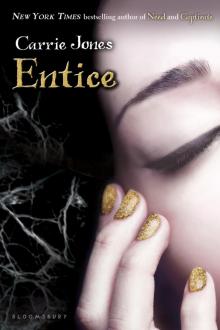 Entice
Entice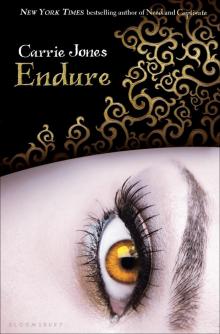 Endure
Endure Need
Need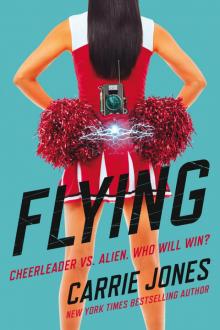 Flying
Flying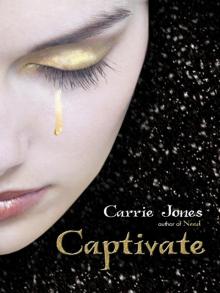 Captivate
Captivate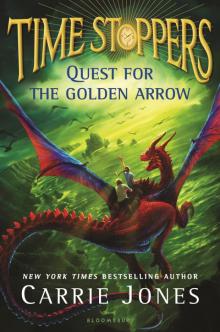 Quest for the Golden Arrow
Quest for the Golden Arrow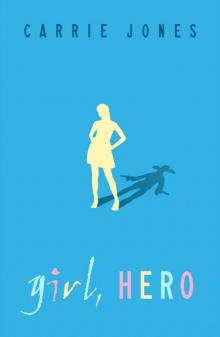 Girl, Hero
Girl, Hero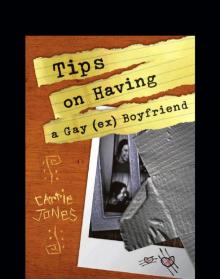 Tips on Having a Gay (Ex) Boyfriend
Tips on Having a Gay (Ex) Boyfriend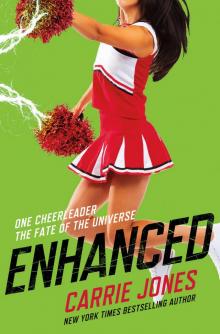 Enhanced
Enhanced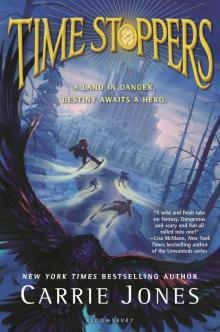 Time Stoppers
Time Stoppers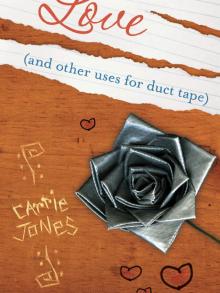 Love (And Other Uses for Duct Tape)
Love (And Other Uses for Duct Tape) Wolf's Hunger
Wolf's Hunger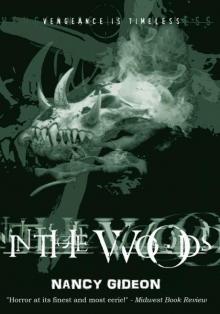 In the Woods
In the Woods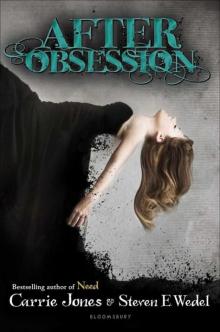 After Obsession
After Obsession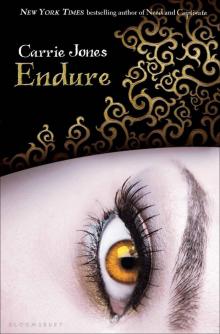 Endure (Need)
Endure (Need)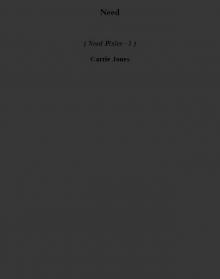 Need np-1
Need np-1